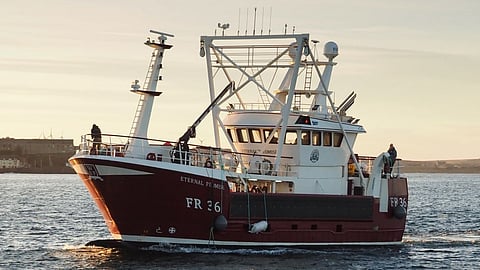AWARDS 2024 | Best Scalloper – Eternal Promise – Macduff Ship Design & Macduff Shipyards
The Scottish Macduff combination of shipyard and design house has long been renowned for its solid, seaworthy and profitable small ships. They all share a highly-refined but attractive look that really sets them apart, and this scallop boat built for coastal waters is a prime example.
They are the kinds of fishing boats that any fisherman would be happy to set out into the North Atlantic in almost any weather in.
"The vessel was originally intended to be a sister ship to the previous vessel," Ian Ellis, Managing Director of Macduff Ship Design, told Baird Maritime, "but a decision was taken early in the contract to build a new design that would offer increased deck/fishing gear space, improved crew welfare, a more efficient hull form, and a new stern gear package with an aim to improve overall fuel efficiency."
Ellis explained that the first hull form was the hull form of the previous vessel, which was tested in order to establish a benchmark for hull resistance. The second and third hull forms featured the same main body, but with different variations of the bulbous bow to help identify the best shape to reduce overall resistance.
"The results from the study indicated a reduction in hull resistance at the two test speeds of eight and 10 knots for both variants, but with one showing a slight improvement over the other due to the bulbous bow wave interaction with the hull," said Ellis. "Given the increased hull size and displacement for the new vessel, this was deemed to be a success.
"By carrying out CFD analysis for vessel hull forms at the early design stage, it ensures that new designs are always improving and lets the yard test its design concepts and to make sure they work before putting into production."
"It is a sister ship to two other vessels, and the third in a successful series of efficient trawlers that carry a good speed and a high bollard pull for quite modest engine power," added Macduff Shipyards' Manager Matthew Watt.
"The layout of the blast freezing and cold store compartments was researched thoroughly and discussed with the refrigeration specialist to ensure that the temperatures to freeze the product could be reached and maintained efficiently. Being able to freeze the volume of fish product in the small spaces onboard was seen as a great success, with efficient use of space."
Ellis said that, with the operational requirements set for Eternal Promise, there were significant challenges in providing optimisation of hull form and crew comfort whilst maintaining high levels of operational efficiency and maximising fishing effort within the hull envelope.
"Working between Macduff Ship design and Macduff Shipyards proved to be worthwhile with a huge amount of knowledge gained within the development of the hull form to ensure optimal performance between all requirements."
Ellis said 2024 was "an interesting year" for Macduff Ship Design, as indicated by the completion of a range of different projects and the start of some new collaborations.
"We have quite a few vessels nearing completion and are eager to see these completed and in service," he told Baird Maritime. "Many areas of the marine industry are showing uncertainty with newbuild projects, which would seem to be largely driven by a lack of clarity about how environmental regulation will impact on the marine sector and what technologies and fuels are likely to be those that become mainstream."
Watt meanwhile remarked that 2024 was, "a very good financial year," for Macduff Shipyards.
"The vessels coming to the yard's repair and refit facilities have diversified significantly in recent years, with an increase in aquaculture boats, wind support vessels, and general workboats. The yard also continues to service the UK fishing vessel fleet as well as building new fishing vessels."
In Watt's view, hybrid and electric-powered workboats will become more prevalent throughout Britain.
"We imagine workboats, where the energy loading and power consumption can vary a lot throughout a day, will move more and more towards hybrid or full electric-powered vessels. This will be somewhat dependent on the location of shoreside infrastructure, which is needing some modernisation in the UK to support electric vessels."
"The entire workboat sector will be under pressure to reduce emissions and develop new green technology and working practices," added Ellis. "The implementation of the new workboat code III in the UK is seeing an impact throughout the sector with all existing vessels having to be upgraded to meet the new code.
Ellis said compliance with this new regulation will inevitably be accompanied by an increase in maintenance and operational costs, or the requirement to renew ageing vessels.
"We have been working with owners looking at new propulsion technology within the aquaculture and harbour operations sectors where we have partnered with local UK and international companies in developing battery electric tugs and workboats," he told Baird Maritime. "We are also looking at how new fuels can be incorporated into the fleet.
For a list of the 2024 "Best Of" award winners, please click here.





